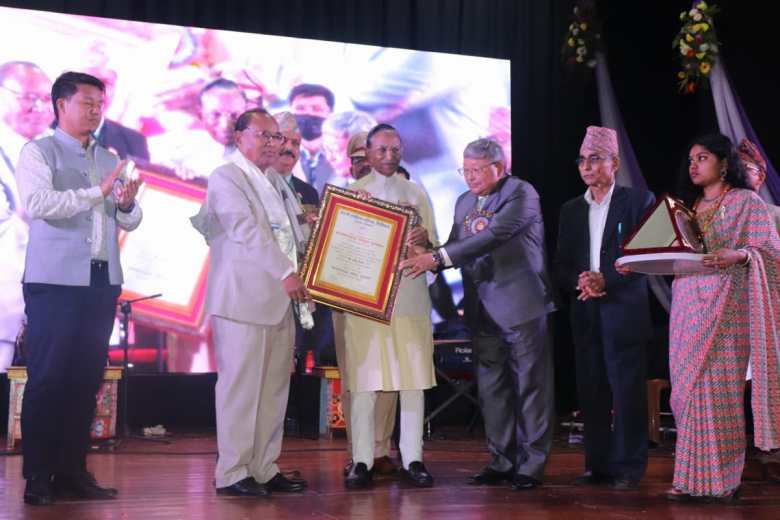The celebration organised by Sikkim Nepali Sahitya Parishad awarded Kanchenjunga Rashtriya Sahitya Purashkar to three Nepali stalwarts in three different categories

Gangtok: Sikkim celebrated Nepali Bhasa Manyata Diwas on August 20, thirty years after Nepali was recognised as part of the 8th Schedule of the Indian Constitution. The Sikkim government has declared the day a holiday this year and on the occasion, Governor Ganga Prasad graced a celebration marked to honour this day.
An award ceremony was held by the Sikkim Nepali Sahitya Parishad to felicitate personalities who have contributed to the language through their work.
The Kanchenjunga Rashtriya Sahitya Purashkar was awarded to three Nepali stalwarts in three different categories.
Bikram Bir Thapa from Meghalaya was awarded in the field of arts, Ranjeet Gazmer from Mumbai for music, and Padmashri Gadul Singh Lama from Sikkim for literature.
Padmashri Gadul Singh Lama, popularly known as Sanu Lama, has been contributing in the field of Nepali literature through his novels and short stories for years. He published his first short story anthology, Katha Sampad, in 1971, composed of stories such as Swasni Manchey, Khani Tarma Ekdin, Phurbhale Gaun Chadyo and Asinapo Manchey, which has since been selected as a prescribed text for the civil services examination of the Union Public Service Commission.

His other works were Gojika in 1981, and Mrigatrishna in 1993 — the latter winning him the Sahitya Akademi Award for the year. He has also written an autobiographical novel, Himalchuli Manitira, a travelogue, Aangan Paratira, a poem anthology, Jahan BagcchaTista Rangit and two translated religious works, Bhagawan Bhiddha Jeewan ra Darshan and Guru Padmasambhava.

Bikram Bir Thapa, a former Kargil war veteran with the Gorkha Rifles, hailing from Shillong (Meghalaya), received the Kanchenjunga Rashtriya Sahitya Purashkar in the field of arts. He is most remembered for his painting of Kathmandu’s Pashupati Nath Temple. He has published seven literary works including three novels, short stories, a biography and the autobiography Mera Akhijhyalbata, in which he narrates tales of the Kargil War.
In his acceptance speech, a wheel-bound Thapa said, “I came to Sikkim knowing people here have a lot of love and respect for art. There is great talent here in Sikkim in the field of arts but no amount of awards can suffice until upcoming artists are given a platform through art galleries.” He expressed his hope that Chief Minister Prem Singh Golay would work towards the same.
Bollywood musician Ranjeet Gazmer from Kalimpong, West Bengal. Gazmer’s music on the Madal (Nepali percussion) is legendary. He was associated with Bollywood musical stars including RD Barman, Jagjeet Singh, Ilayaraja, Razia Sultan, Bappi Lahiri, Ismail Darbar, Jatin-Lalit, Anu Malik, and Danny Denzongpa. Gazmer is credited for playing Madal in the famous movie Umrao Jaan, songs such as Kanchi Re, and the Nepali hit, Chiso Chiso Hawa Ma among others.

He said, “Sikkim expresses the unity of Nepali people like no other state in the country. Receiving the award today feels as exhilarating as hoisting a flag atop Mount Kanchenjunga.”
Two students from Sikkim, Jyotsna Sharma and Nar Bahadur Chettri (Ghimirey) who secured top ranks in Post Graduation in Nepali language were also felicitated with Prem Lal Khanal Smriti Purashkar.
Governor Ganga Prasad acknowledged the contribution of the Sikkimese people and the wider Nepali-speaking diaspora in getting the language recognised in the 8th Schedule of the Indian Constitution. He said, “Mother tongue or Matri Bhasa is an expression of culture, tradition, history, community, and the country as well. Language is a lifeline of human development and makes society stronger. It is a medium for cultural exploration. The three awardees have contributed to the global propagation of Nepali as a language through their work. They have made the country and the Nepali community proud. Their works inspire the younger generation.”
Source : News


